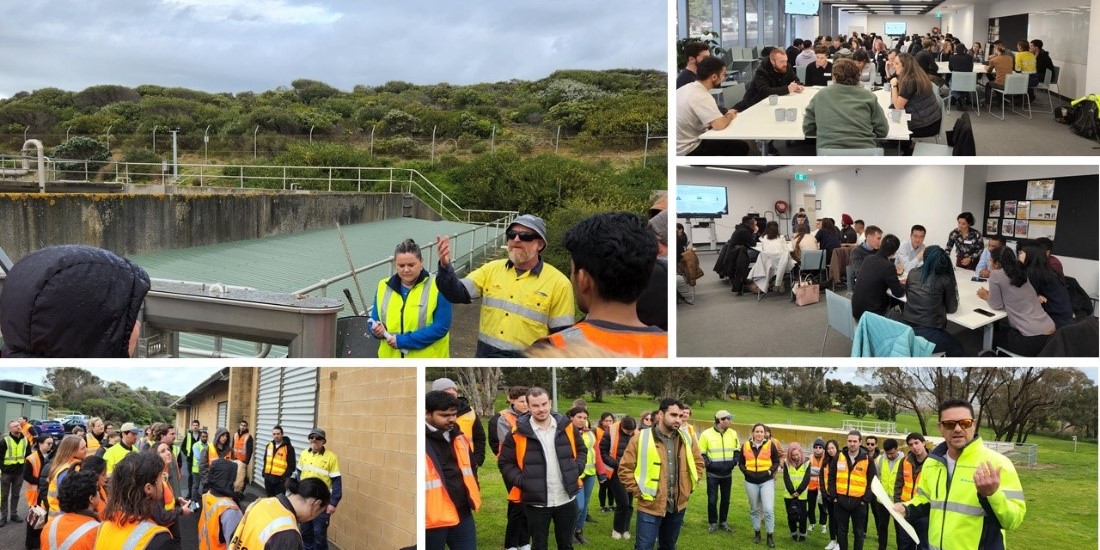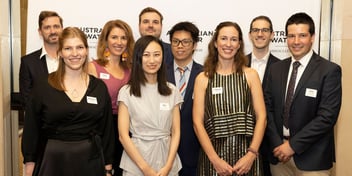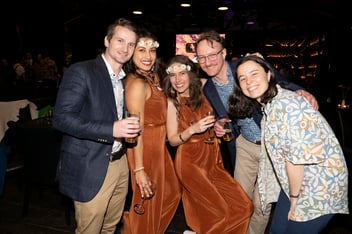Three great VIC Branch events

The AWA Victorian Branch held numerous great events over the last few months. We're highlighting three of them, focusing on two technical events and a YWP Regional Study Tour.
Circular Economy Tech Event
AWA's Victorian Branch, alongside GHD, presented the technical event Transitioning the Victorian Water sector towards a circular economy - from now to beyond on August 20.
The virtual event was hosted by Amanda Gilfoyle (GHD). It featured leading voices Cate Turner (Sustainability Victoria), Sean O'Malley (PlanetArk), Shaun Cumming (Barwon Water) and Oliver Maennick (GHD) sharing their alternating perspectives on circularity.
Overwhelmingly, the theme for the session was collaboration. Technical solutions alone are not enough to break down traditional linear mindsets.
This insightful session clearly demonstrated that opportunity is abundant, but taking on the water industry's most pressing challenges will require collaboration across our water, energy and waste sectors.
YWP Regional Study Tour
In September, we launched the Vic YWP Regional Study Tour with a refreshed format on the old YWP Conference. It was a blast to see the event fully sold out and a return to a two-day program enabling us to visit more sites within regional Victoria. Key highlights of the day included hearing from Greg from Wadawurrung Country, giving us a welcome to country and insights into the enduring connection between First Nations and water; fascinating insights from Deakin Uni on Smart Water Networks; and also an interactive workshop from DELWP that questioned our own water literacy and understanding of where our tap water comes from.
Of course, this was only the beginning of our trip which then expanded to tours of both the Warrnambool and Colac Water Wastewater Treatment Reclamation Plants (a much snazzier title!) and insights into filtration, expansion and biogas capture combined with lots of networking between fellow YWPs. One big takeaway I got was that within water, we work together with our interdisciplinary partners, and it was great meeting up with a few electrical engineers; and gas and oil peeps on the tour!
Big thank you to our sponsors LC Water and Wannon Water, along with event supporters DELWP and Barwon Water, and, of course, last but not least, YWP Committee Study Tour leads Tamar Haviv and Joseph Elderkin, who made this event possible.
Here's to catching a few YWPs at our next YWP event!
Stop Pushing the Planetary Boundaries Event
In August, the Victoria branch of the AWA hosted an event looking at the Planetary Boundaries Framework (2009) that characterises the limits of acceptable alteration to nine critical earth systems. Celeste Morgan (Arup) opened the evening by introducing these boundaries and discussing the current status of seven of the nine boundaries and the drivers for degradation.
We are currently at a critical point for climate change, which is a 'core' boundary through which all others operate. How can we use the insights from this framework to start modifying our actions and bring our earth back into a healthy and stable environment for future generations?
Dr Catherine Rees (Melbourne Water) discussed one of the boundaries where we are currently at the highest risk: biogeochemical flows. Dr Catherine explained a new "bubbles" model that Melbourne Water is adopting to model nitrogen in Port Phillip Bay, embracing more significant complexities in the interactive effects of nutrients, detritus, river flows and actions taken at wastewater treatment plants.
Ben Mason from Frontier Economics then talked about innovations in economics to capture the complex externalities associated with environmental outcomes (both for better and worse), including a new international project (still in its early days) to introduce "Nature-Based Disclosures" requirements in reporting to investors.
Finally, we heard about a novel way to deliver BIG ideas in our cities: Regen Melbourne. Regen Melbourne is an organisation born out of Melbourne's lockdowns, which has a mission to create safe and just spaces for humanity and acts as a research lab, strategic convener, and backbone for ambitious demonstration projects. The alliance of 135 organisations uses Donut Economics as the framework to answer the question, "What can we do at a systemic level to increase a city's resilience?" The Swimmable Birrarung is one such demonstration project with a vision to create a chain of swimming places between Dight Falls and Nairm (Port Phillip Bay) by 2030.
A key takeaway from the evening came from Kai Lofgren at Regen Melbourne speaking to the engineers in the room: as systems thinkers, our challenge now is to "go back to embracing complexity". In tackling a wicked problem like preserving our planet, this is essential.



